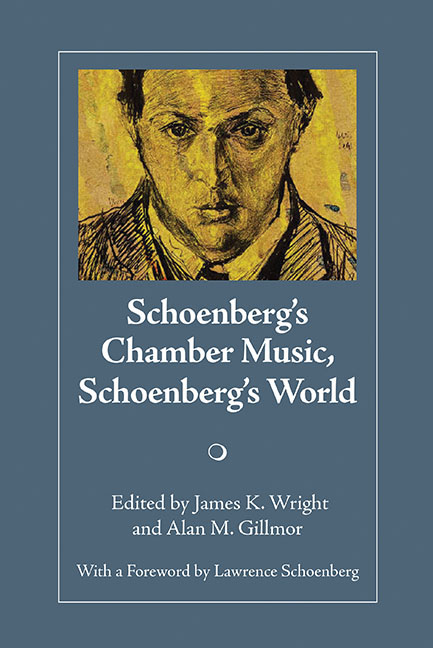Book contents
- Frontmatter
- Contents
- Foreword
- Preface
- HISTORICAL PERSPECTIVES
- ANALYTICAL PERSPECTIVES
- OTTAWA SYMPOSIUM AND CHAMBER MUSIC FESTIVAL PHOTOS
- PERFORMANCE, RECEPTION, AND INTERNATIONAL INFLUENCE
- Echoes of Pierrot Lunaire in American Music
- Expressivity, Color, and Articulation in Schoenberg's Seventeen Piano Fragments
- Critical Reception, Performance, and Impact of Schoenberg's Music and Thought in Canada Prior to 1960
Echoes of Pierrot Lunaire in American Music
from PERFORMANCE, RECEPTION, AND INTERNATIONAL INFLUENCE
- Frontmatter
- Contents
- Foreword
- Preface
- HISTORICAL PERSPECTIVES
- ANALYTICAL PERSPECTIVES
- OTTAWA SYMPOSIUM AND CHAMBER MUSIC FESTIVAL PHOTOS
- PERFORMANCE, RECEPTION, AND INTERNATIONAL INFLUENCE
- Echoes of Pierrot Lunaire in American Music
- Expressivity, Color, and Articulation in Schoenberg's Seventeen Piano Fragments
- Critical Reception, Performance, and Impact of Schoenberg's Music and Thought in Canada Prior to 1960
Summary
Few twentieth-century compositions have affected as many American composers as Schoenberg's melodrama cycle Thrice Seven Poems from Albert Giraud's Pierrot Lunaire, Op. 21, for Sprechstimme and mixed ensemble (1912). But since it is primarily seen as a potent model for European composers, we may not recognize how thoroughly the work has infiltrated American musical consciousness. Its absence from accounts of American music can be attributed to historiographical efforts to minimize the impact of Europeans on American music, to “anxiety of influence” on the part of certain composers and to the fact that its once-new features are now customarily utilized. In any case there have been countless American compositions echoing Pierrot's unique instrumentation, theatricality, musical language, cyclic structure, vocal treatment, and notation. American composers have paid tribute to Pierrot through imitation, quotation, “misreading,” and parody in a variety of genres including chamber works, operas, and radio song-plays. What follows will elucidate the manifold influences of Pierrot on the music of several generations of American composers.
Early Reactions
Early European Pierrot performances in the 1910s sparked heated debates in the American press. Many critics predictably dismissed it. Yet the work, available as a pocket score since 1914, soon aroused the interest of American composers. In 1915 experimental composer Henry Cowell, who later befriended Schoenberg, conceived the dramatic work Red Silence for speaker, flute, violin, cello, and piano. Charles Griffes, as interested in new musical currents as Cowell, also followed Schoenberg's developments with interest; and the unusual chamber instrumentation and theatrical implications of his Sho-jo, a pantomime, and The Kairn of Koridwen, a dance-drama (both 1917), show an obvious affinity with Pierrot. In 1917 Griffes himself informed a representative of the New York American about the The Kairn's kinship with Pierrot. Charles Ives also used Sprechstimme techniques and explored the mixed chamber ensemble with and without voice independently from Schoenberg, even before 1912. Yet Ives's music only gradually became known from the 1920s onward.
- Type
- Chapter
- Information
- Schoenberg's Chamber Music, Schoenberg's World , pp. 173 - 192Publisher: Boydell & BrewerPrint publication year: 2009



